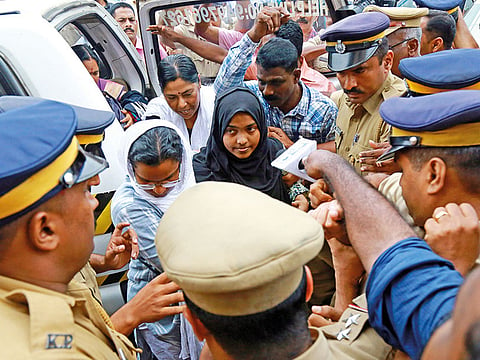Hadiya issue involves national security, says Kerala BJP chief
The apex court has ordered the 24-year-old to appear before it on November 27 to give her testimony

Thiruvananthapuram: A day before India’s Supreme Court hears what Hadiya, a woman from Kottayam district in Kerala who embraced Islam, has to say, political posturing continued in her home state.
Bharatiya Janata Party (BJP) state president Kummanam Rajasekharan said on Sunday that the Hadiya case was not just a case of a ‘love’ marriage, but one that concerns national security.
Reacting to Hadiya’s statement on Saturday, which stated she had married a Muslim man of her own free will, Rajasekharan said what she says at the Supreme Court on Monday is what really matters. Hadiya made the statement while being taken to the Kochi airport under tight police security, on way to the national capital, New Delhi.
The 24-year-old Hadiya is the daughter of K.M. Asokan, a former Indian defence serviceman, from Vaikom in Kottayam district. Born a Hindu, and named Akhila, she married Shefin Jahan last year, a move decried by her parents.
Following the marriage and the allegation that she was a victim of forceful conversion to Islam, Asokan filed a petition in court. In May this year, the Kerala High Court nullified the marriage, ordered a probe and sent her to her parents’ home, with restrictions for interacting with the outside world.
Her husband, Jahan, then moved the Supreme Court against the annulment of their marriage, and the apex court observed that prima facie the high court had no authority to annul the marriage. The apex court then ordered Hadiya herself to appear before it on November 27 to give testimony.
All the while, Kerala police has been providing protection to Hadiya and the family as concerns rose about the security of the woman in the context of varied and extreme religious and political opinion about the issue.
After her schooling in Kerala, it was when Akhila was studying homoeopathy in Tamil Nadu that she was exposed to Islam, and over the next year she started wearing a head scarf and stopped attending religious functions in her own home. She also changed her name to Hadiya.
While provocative statements are being made by different religious segments about Hadiya’s decision, the woman said on Saturday: “No one forced me to convert; I want to live with my husband”.
She is expected to reiterate that testimony in the apex court on Monday. If she does that, the court is expected to let her live with her husband.
That in turn will bust the claims of ‘love jihad’ being the reason for Akhila becoming Hadiya. But the complex realities of inter-religious marriages will continue to play out in India irrespective of what the court hears from Hadiya on Monday.



